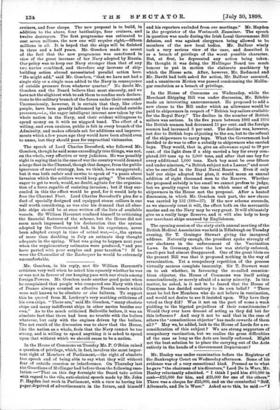In the House of Commons on Tuesday Mr. P. O'Brien
raised a question of privilege, which, in fact, involves the most impor- tant right of Members of Parliament,—the right of absolute free speech and of being able to say what they will without fear of outside coercion or interference. On Thursday last the Guardians of Mullin gar had before them the following reso- lution :—"That on this day fortnight the Board take action with regard to the vile, anti-clerical speech made by Mr. John P. Hayden last week in Parliament, with a view to having his paper.deprived of advertisements in the future, and himself
and his reporters excluded from our meetings." Mr. Hayden is the proprietor of the Westmeath Examiner. The speech in question was made during the Irish Local Government Bill debates, and was against clergymen being allowed to ba members of the new local bodies. Mr. Balfour wisely took a very serious view of the case, and described it as a breach of privilege of the worst possible character. Bat, at first, he deprecated any action being taken- He thought it was doing. the Mnllingar Board too much honour to put in motion the elaborate machinery by which the House acts. After, however, Mr. Redmond and Mr. Davitt had both asked for action, Mr. Balfour assented, and a unanimous Motion was passed condemning the Mullin- gar resolution as a breach of privilege.


































 Previous page
Previous page